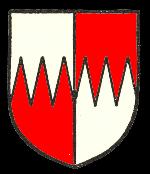Bramblehanger Manor Luton
Bramblehanger Manor was one of twelve minor manors of Luton which were probably never organised on a true manorial basis - as a manor court with jurors, bye-laws and copyhold properties owned by tenants of the manor. Bramblehanger Manor first makes its appearance in 1247, when it was held of the Prior of Saint John of Jerusalem as overlord, who held it with the Manor of Clifton. The overlordship is last mentioned in 1515 when John Sylam held it by a rent of fifty nine shillings a year.

Fitz Warin coat of arms
The first tenant of the manor found in surviving documents is Alan de Bramblehanger who held it in 1247 and was still in possession in 1269. At that date the property consisted of just one messuage, or house, and four virgates of land. By 1309 Peter Fitz Warin was tenant and in that year conveyed the manor to his son William. The Manor of Bramblehanger was first called by that name in surviving records in 1324 when Fitz Warin forfeited it to the Crown on account of his bad behaviour. King Edward II (1307 to 1327) granted the manor to his niece Eleanor, wife of his favourite Hugh le Despenser.
At some point Fitz Warin may have been granted a pardon and restitution as the manor was still in his family in 1348 when Hugh Fitz Warin conveyed it to John de Northewell. The manor does not occur in the historical record again until 1425 when it was owned by Joan, wife of John le Waleys, who also owned Woodcroft Manor. Her daughter Joyce, wife of Robert Lee, inherited and, in 1446 alienated it to trustees.
In 1515 John Sylam, who also had Brache Manor, died in possession of the manor which eventually passed to his daughter Mary Lock, who later married Robert Cheyne who, in 1546, conveyed Bramblehanger Manor to trustees as part of the marriage settlement of his son Thomas who succeeded to the manor in 1554, devising it to his son Robert in 1614.
Robert Cheyne died in 1632 and in 1676 his son Thomas conveyed the manor to John Crosse whose family held it for over two hundred years. In 1890 Bramblehanger Manor, now Great and Little Bramingham Farms, was purchased by the trustees of the will of Sir Edward Page Turner, deceased and remained in the Page Turner family into the 20th century. However, a succession of Law of Property Acts in the 1920s effectively abolished manors in all but name. including copyhold land and manorial courts and income